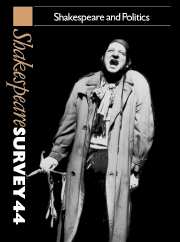Book contents
- Frontmatter
- Shakespeare and Politics
- Language, Politics, and Poverty in Shakespearian Drama
- Some Versions of Coup d’état, Rebellion and Revolution
- Woman, Language, and History in The Rape of Lucrece
- Love in Venice
- Two Kingdoms for Half-a-Crown
- ‘Fashion it thus’: Julius Caesar and the Politics of Theatrical Representation
- ’Demystifying the Mystery of State’: King Lear and the World Upside Down
- Tragedy, King Lear, and the Politics of the Heart
- The Politics of Shakespeare Production
- Shakespeare in the Trenches
- Shakespeare’s Earliest Editor, Ralph Crane
- Shakespeare’s Falconry
- Telling the Story of Shakespeare’s Playhouse World
- Shakespeare Performances in England, 1989–90
- Professional Shakespeare Productions in the British Isles January-December 1989
- Critical Studies
- Shakespeare’s Life, Times, and Stage
- Editions and Textual Studies
- Books Received
- Index
Two Kingdoms for Half-a-Crown
Published online by Cambridge University Press: 28 March 2007
- Frontmatter
- Shakespeare and Politics
- Language, Politics, and Poverty in Shakespearian Drama
- Some Versions of Coup d’état, Rebellion and Revolution
- Woman, Language, and History in The Rape of Lucrece
- Love in Venice
- Two Kingdoms for Half-a-Crown
- ‘Fashion it thus’: Julius Caesar and the Politics of Theatrical Representation
- ’Demystifying the Mystery of State’: King Lear and the World Upside Down
- Tragedy, King Lear, and the Politics of the Heart
- The Politics of Shakespeare Production
- Shakespeare in the Trenches
- Shakespeare’s Earliest Editor, Ralph Crane
- Shakespeare’s Falconry
- Telling the Story of Shakespeare’s Playhouse World
- Shakespeare Performances in England, 1989–90
- Professional Shakespeare Productions in the British Isles January-December 1989
- Critical Studies
- Shakespeare’s Life, Times, and Stage
- Editions and Textual Studies
- Books Received
- Index
Summary
I thought of calling this chapter 'A Tale of Two Bishops', in homage to the two figures who appear at regular intervals in the history plays framing the person of the king, but on second thoughts, that had too medieval a ring for such an innovative experiment as the dual monarchy, or the union of the two crowns as it was called at the time. It is ideally defined at the end of Henry V:
God, the best maker of all marriages,
Combine your hearts in one, your realms in one.
As man and wife, being two, are one in love,
So be there 'twixt your kingdoms such a spousal
[. . .]
That English may as French, French Englishmen,
Receive each other, God speak this 'Amen'
(5.2.344-53)words probably well designed to make any true-blooded French or Englishman shudder, but which faithfully echo the hopes expressed by the treaty of Troyes in Hall's report,
that [. . .] bothe the crounes [. . .] of Fraunce and England perpetually be together in one and in thesame persone [. . .] that there shalbe fro hence forwarde for euermore peace and tranquillitee and good accord and common affeccion and stable frendship betwene thesame realmes and their subiectes.
Such were the terms of the union designed by Henry V and so fatally mishandled by his successors.
My hesitations over the title were the sum of doubts about Henry's double dealings in the concluding tale of the histories. The success story in five acts and as many prologues is defeated at the end by the flat statement that it was of no avail, leaving us to wonder what exactly we have been watching. Policy or politics? Bishops or crowns? Duck or rabbit? We know how much depends on the way we look at the design. And we know how English cats may look at kings' crowns, where French dogs dare only look at bishops, which is but the beginning of our differences.
- Type
- Chapter
- Information
- Shakespeare Survey , pp. 55 - 64Publisher: Cambridge University PressPrint publication year: 1991



